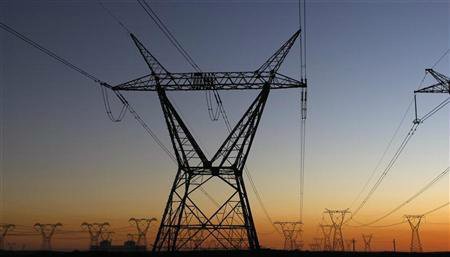Energy is one of the key ingredients to a nation's economic development. Countries with access to energy at an affordable price have an advantage over their counterparts in terms of development. No wonder any negative changes in energy output levels or prices causes havoc all over the world.
I was therefore shocked some days ago when I came across an article that mentioned the intention of ESCOM to increase it's tariffs from January 2016.
...ESCOM...
With over 95% of electricity in Malawi being generated by Hydro power (ESCOM ca. 2015), the main if not the sole supplier of electrical energy used in most industries and households across the country is ESCOM. Over the last 10 years or so, the nation has been facing regular power cuts with the duration and frequency of the power cuts increasing as time has been passing by. And so has the tariffs been hiking.
According to ESCOM, their main problem in supplying the nation with electricity has to do with too old equipments, aquatic debris/plants floating in water and siltation. But hey, the company has been in operation for over 50 years now, they should have foreseen the depreciation of the machinery and take necessary measures. That is why in companies you account for amortisation and depreciation. Though for siltation and debris they are not entirely to blame, they could as well put in place measures to curb those problems. Which leads us to our part in this whole saga.
Both siltation and debris/plants in water has to do with how we take care of our environment. Soil erosion is one of the main causes of siltation and deforestation triggers soil erosion. We are the culprits of why there is so much soil erosion in this country.
...reason for soil erosion...
Our population is growing at a fast rate. As a result, there is a need for more housing and arable land as well as energy. With only 9% of the population having access to grid electricity in Malawi (World Bank ca. 2015) and the increasing tariffs, no wonder that the majority of the Malawians opt for biomass energy like firewood and charcoal as the main source of energy. Biomass energy produces a lot of carbon dioxide (pollutes the environment) and it contributes a lot to deforestation in Malawi as trees have to be cut down in order to get the firewood or charcoal. A tendency that is contributing to the ever increasing soil erosion in the country which is affecting ESCOM's operations through siltation at their various plants.
In terms of lighting our homes, most people use candles, torches or kerosene lamps due to lack of electricity. The quality of light that can be obtained from the above mentioned items can be harmful to the eyes. It is usually not bright enough to do some activities like reading. It is important to know as well that candles and kerosene lamps may emit pollutants which might be a health hazard to our lives. Not only do we struggle everyday to buy a candle or paraffin to light our homes, but in that quest we also do put our health in danger.
As seen above the main reasons why Malawians opt for biomass energy includes lack of access to electricity, unreliable supply of electricity and high costs of using the electricity. I therefore ask myself what ESCOM has been doing all these years to improve this situation because their mission statement is to provide reliable and affordable electricity to the nation. These regular power-cuts is not a sign of reliability, the tariff hikes is neither a sign of affordability nor is having over 90% of the population without access to electricity a sign of serving the whole nation. Maybe it's time they do a double-check on their mission statement and vision, to try to see what is working and what is not.
...solutions...
In terms of affordability of electricity which is a problem to those with access to electricity, I would suggest a decrease in the tariffs on domestic households. The best way to do this would be to introduce a system whereby the rate for domestic households during on-peak periods is higher than during the off-peak periods. Let the current rate be the off-peak rate while the rate they are planning to implement next year should be the on-peak rate. This would in a way force some people like me who are cautious about their pockets to use more electricity during the off-peak periods than the on-peak periods.
If implemented and followed by most households, not only will the households lower their electricity bills but it would also help in the supply of electricity. Though at a minimal scale, it would reduce the power cuts and thus increasing the reliability of electricity in the country. This is a mathematical calculation. During the off-peak periods, most people do no use electricity which means that some electricity is just wasted though ESCOM has generated it. So why don't we take advantage of that. Motivate the people to use more electricity during the off-peak periods by reducing the rates. Both ESCOM and citizens would come out as winners.
Just a tip to everyone, there is a higher chance that power cuts will happen during the on-peak periods. To be on the safe side, know the off-peak periods which are from 12 hrs to 17 hrs in the afternoon and from 00 hrs to 7 hrs in the morning and try to do all that you can during that period like turning on your geyser/boiler or ironing.
As for accessibility, ESCOM has a lot of work to do. And maybe our best shot is to accelerate the usage of other sources of energy like solar energy which is in abundant in Malawi. The government should continue to show interest in this field. Maybe they can even provide subsidies to those who would like to have solar energy in their houses. It might motivate some people to invest in solar energy and other sources of renewable energies. There are numerous organisations, institutions and firms in the country who are promoting for example solar energy as well as efficient use of biomass energy. I do commend their work and hope that it will reach more people in the country.
Bottom line is, we need readily accessible, reliable and affordable energy in order to progress as a nation and if possible more efficient and cleaner energy. This is why I have decided to donate at least 10 solar lights to the elderly in Ntchisi next year when I visit the country. All those who would like to help me in fulfilling this mission, please contact me on how you can make a contribution through this blog. Contact the page 'projects' for more information.
...One solar light at a time, one more household with cleaner, safer, affordable energy and better light...

